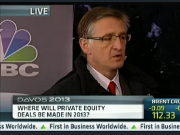Unions can fix broken economy

Jennings said that the general employment situation was “very bleak”: the International Labour Organisation (ILO) in its annual report yesterday forecasts the number of jobless to rise by 5.1 million in 2013 to reach 202 million and further rise to 205 million in 2014.
Jennings said there has to be a response from business and government. They must realise that unions can provide the answer.
"It's time to recognize the voice of labour and work with labour, we know how to get this job done," Jennings told CNBC. "We can fix this, give us a seat at the table, we are part of the solution."
"It's time to put the money sitting in those cash mountains to work, people are desperate to work. They are looking for quality jobs and a decent wage … the world needs a pay rise," Jennings said.
He said that Germany had managed to weather the storm until now because they had kept up apprenticeship programmes and protected workers.
“They kept people in work, they put young people in work. They continued their apprenticeship programmes. They were ready when we had that glimmer of light two years ago because they were prepared to work with the labour movement,” he argued.
Joined in the interview room by a private equity banker from Blackstock, Jennings accused the private equity industry of slashing jobs to maximise profits
"We are not going to fix this with a private equity business model," Jennings said. "I want to see a call to action at Davos this year on jobs and investment."
Watch the full interview here:
“The day after Lagarde and Barroso said things were getting better the unemployment rate in Greece registered 28.6%. We have record unemployment in Europe. It’s time to change the model. Austerity is not working. It is not providing employment opportunities. It is not helping investment or the business climate. We want to put business to work, we want to put that cash mountain to work and then we will have a much better horizon for business and working people,” said Jennings.
Asked why union membership is declining in the US, Jennings replied, “Because the American worker does not get a fair shake in the place of work. There is an assault on them. There is fear in the work place and there is no opportunity to organise. Give me a fair chance I’ll organise Walmart tomorrow. You saw what happened on the streets of the United States last year when the Walmart workers said we have had enough. Look at where the w ealth has gone in the US – it has floated to the top. The one percent has won and one tenth of one percent has accumulated enormous wealth whereas the US worker has not had a pay rise in 40 years. Don’t put all the corporate restructures on the back of working people – they haven’t had a wage rage for 40 years. How are you going to get demand back in the economy without improving aggregate demand? The world needs a pay rise. They’ll only get that by working with labour and the elites here in Davos say its time to give something back.”
Jennings concluded, “Do you know how much is spent on active labour market policies? One percent of the output of a nation goes into retraining, skills development. We must lift that percentage up. We have a technological revolution which is changing the world of work. The idea of a job for life is gone. We now have 40 percent of the world’s work force on non-standard forms of employment. We need a new commitment, a new social contract, to help people through their working lives. Retraining, income support, to give people hope that there is a safety net which will help the business community invest and sell their products and a skilled motivated work force. The work force is ready. They are hungry for change. Hungry for opportunity! Give it to them.”


